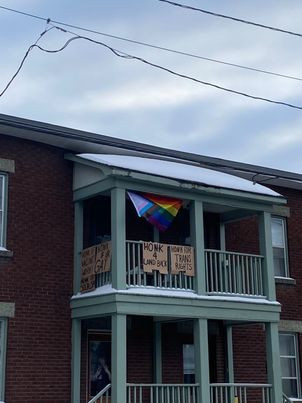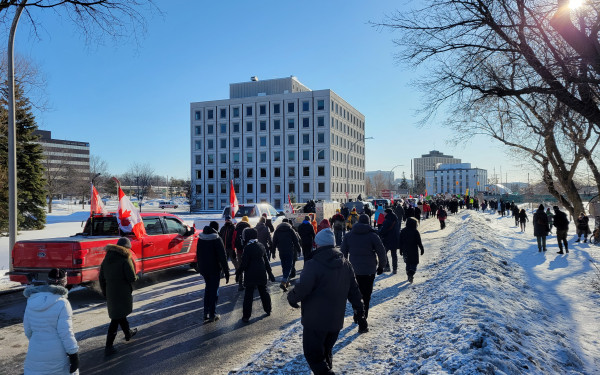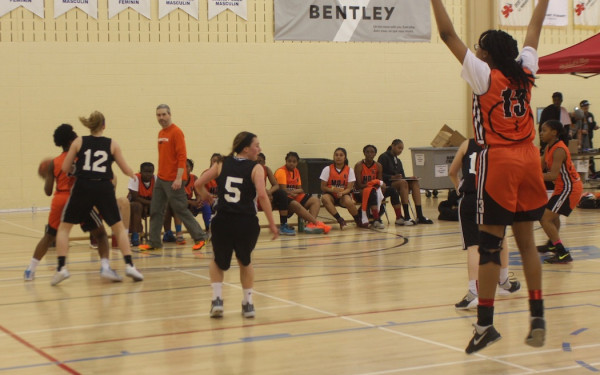Marginalized communities are bearing the brunt of the “Freedom Convoy”
Learn how the ‘Freedom Convoy’ is hurting marginalized communities in Ottawa. Photo Caroline Marsh
Blocked streets and non-stop noise are making Ottawa unlivable for the city’s unhoused and disabled populations
In the middle of the night on Feb. 3, a man got out of his car and approached Meghan Ryland’s townhouse in Centretown, Ottawa, a mere 2 km away from Parliament Hill. Outside the home were hung signs reading “honk if ur gay” and “honk for trans rights” among others, as well as a rainbow flag.
“The guy was yelling as he came up the steps. My roommate heard him trying to open the door. She was terrified. He called us child predators and pedophiles because of our signs and our flag,” said Ryland.
Since Jan. 27, thousands of protesters have been amassing from across Canada in Ottawa as part of what they call the “Freedom Convoy.” Originally started as a movement to make Prime Minister Justin Trudeau reverse vaccine requirements for truckers crossing the southern border, the protesters have shifted their priorities. They want all COVID-19 mandates, along with Trudeau, gone.
The convoy has been in the capital for over two weeks, and its presence has had deep impacts on Ottawa’s population. Moreover, certain communities have been hit especially hard by the movement. As protesters honk their horns for their right to remain unvaccinated, Ottawa’s most vulnerable are fearing for their lives, unable to leave their homes.

“Our staff member tried de-escalating the situation until our security guard came, but he was called racial slurs by the protesters.” — Caroline Cox
Within the first few days of the occupation, a shelter for unhoused Ottawans was harassed by members of the convoy. Caroline Cox, the senior communications manager at Shepherds of Good Hope, recalls the traumatic events that went down on Jan. 29.
She had never heard of anything like it. “We knew the convoy was coming, and we knew we had to be prepared. The trucks were all around us—the honking was incessant and triggering. The protesters just started coming in to get food in large numbers. We’re here to feed the homeless, not truckers.”
Because several service users from Shepherds of Good Hope have mental health issues, interactions between clients and truckers have been mortifying, Cox says. “One of our clients, who has a very severe mental illness, was going around the trucks. Two folks got out of their truck, thinking he was trying to break in. They had him up against the truck and were yelling at him. Our staff member tried de-escalating the situation until our security guard came, but he was called racial slurs by the protesters.”
Convoy-related incidents at Shepherds, especially the harassment of the shelter, have attracted lots of media attention and have shone an especially negative light on the truckers. In response, some convoy participants have harassed the shelter even more. “Emails were sent to every senior staff member accusing us of being communist, pedophiles and other QAnon stuff. We were told ‘you all have faces and you all have addresses.’ Official members of the convoy said that what happened to us was an Antifa false flag operation."
Currently, Shepherds of Good Hope houses around 230 people every night and serves between 500 and 600 meals daily from its soup kitchen. The organization got shout-outs from politicians denouncing the convoy, including the prime minister. In the wake of the harassment, the shelter has received $750 thousand in donations.
Martine Dore is the director of programs at Cornerstone Housing for Women, a shelter located just 700 metres from Parliament. Alongside her colleagues, she is helping the 53 women living in the shelter cope through the additional trauma caused by the convoy. “I believe the definition of sound torture is 82 decibels. At times, the convoy reached 150 decibels,” she said. “When it goes on for hours, it is very traumatizing for people who suffer from anxiety, trauma, and mental health issues. It crowds your whole being.”
“We’ve seen a decrease in mental health, and an increase in anxiety and substance abuse among the women as a result of this convoy,” Dore said. Some of her teammates have been verbally assaulted by protesters simply for wearing masks in public. She remembered one of her Black teammates, who was also harassed by truckers, telling her, “in my job, I care for vulnerable people, but now I find myself in a vulnerable place.”
“One of our women had to be sent to the hospital because of trauma from the cacophony.” — Martine Dore
Many women residing in the shelter have been further traumatized by the convoy. Dore stopped for a moment and took a deep breath. “The residents are exhausted. This occupation has been the worst for them. One of our women had to be sent to the hospital because of trauma from the cacophony.” Normally, the women are able to get out for fresh air and calm down, but that has now been impossible.
The Cornerstone shelter has felt the full weight of this convoy. Dore described the atmosphere within the shelter as one of overwhelming sadness. She explained how she could hear honking for days, as well as the reek of diesel. She mentioned how these effects would stay with the shelter’s residents for a long time.
On Feb. 7, Ontario Superior Court Justice Hugh McLean enacted an injunction against the convoy for 10 days. Until then, protesters are not allowed to honk their horns incessantly. The protesters, however, have gotten creative in their disturbances. Firecrackers and fireworks have been continuously going off in high-density residential areas, putting citizens at risk.
Ottawa city councillor Catherine McKenney made their stance clear on Twitter, writing “Dear @JustinTrudeau please do something. You have a responsibility to protect your Capital. We are under siege. Day 9.” According to Abacus Data, nearly 9 in 10 Ottawans believe the occupiers have made their point clear and should return home immediately.
Like McKenney, many Ottawans have criticized the Ottawa Police Service’s response to the convoy. The authorities had stated that anyone smuggling gasoline into the convoy would be arrested, but protesters once again found a workaround. The convoy members have been using jerry cans, large opaque metal containers, meaning that police cannot identify whether they are carrying in water or fuel.
As of Feb. 12, the Ottawa Police have issued over 2,600 tickets and have made 26 arrests in relation to the convoy. Hundreds of trucks remain in areas demarcated by the police, while many have come and gone in the last two weeks. The situation, however, is not getting better as quickly as locals hoped. The occupation has been devastating for residents with disabilities.
Thony Jean-Baptiste is the program director at ABLE2, a local charity that provides support and vital services to people with disabilities. Because of the convoy, the organization has been paralyzed. “The traffic is impossible to get through. For people with mobility issues, the blocking of major roads has been detrimental. The impact that the convoy has had is very serious and is hurting people with disabilities,” he said.
Jean-Baptiste says that blind and visually impaired people have faced the biggest challenges during the occupation. They rely on their hearing to guide them when crossing streets and navigating the city. “With the endless noise from the trucks, how do you think they can cross? On top of this, the buses have stopped. [...] This has really increased their isolation,” said Jean-Baptiste.
“The rights of the people in the convoy are no more important than the rights of people with disabilities locked in their homes who can’t get assistance for their basic bodily needs.” — Thony Jean-Baptiste
A lack of access to the city’s core, Jean-Baptiste says, is preventing clients from getting the help they require. “Our volunteer program is how we reach out to people in need. It has been completely shut down because of the convoy. The volunteers can’t get to clients. People are suffering and are in dire conditions because they cannot get assistance. Our paratransit has been unable to pick people up from their homes. They are now missing medical appointments,” said Jean-Baptiste.
“Between 30 and 40 per cent of our clients reside downtown. Imagine needing assistance multiple times a day from volunteers. Getting fed, going to the bathroom—nobody can get to them. They have been robbed of their humanity. We can’t even adapt our services because there is no way of reaching people if the city is shut down,” he said.
There needs to be a balance between people’s politics and people’s right to basic care, Jean-Baptiste says. “I don’t want to get political. This is about keeping disabled people safe. [...] The rights of the people in the convoy are no more important than the rights of people with disabilities locked in their homes who can’t get assistance for their basic bodily needs. These truckers can’t continue hurting these people by holding the city hostage. We denounce this completely. People are suffering.”
Ottawa residents are beyond tired, and those who have been most affected have had their voices ignored by authorities. Organizations supporting vulnerable communities in Ottawa are pleading for an end to the convoy, seeing as certain communities are in desperate need of the services that have been halted.
In response to the attempted break-in and harassment prompted by their pro-LGBTQIA+ iconography, Ryland and their roommates have doubled down. “We’ve added more since the incident. We added ‘Stay strong Ottawa’ because people need to hear it right now. If the situation gets any worse, we’ll probably put up more.”




1_600_375_90_s_c1.jpg)